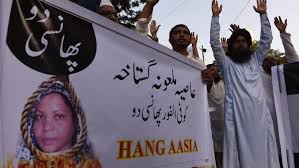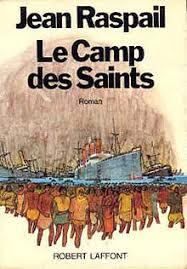One is never sure what to believe from the endless avalanche of stories from the main-stream media. A few weeks ago the migrant caravan was described like something out of an apocalyptic dystopia – or to go back in time, perhaps an image from Exodus – thousands of men, women and children, trudging over a thousand miles under the hot tropical sun across brutal tarmac and dirt roads, hoping just to fall down on America’s doorstep, looking for where the grass may be greener – or even just green – for ‘opportunities’ not to be found in the failed, crumpled, venal, socialist states, whence they hail.
When I wrote the version of this article for Crisis, the migrants were on their way; now they have arrived, with numbers attenuated: What began as a caravan of ‘15,000’ is now apparently down to three, thousand that is, men, women and children, now be-camped. There are some threats that they will just ‘rush’ the border, prompting President Trump to ask for more officers, even from as far away as New York. Just this morning, tear gas was fired, as ‘projectiles’ were thrown at the border guards, and Trump is now threatening to close the border outright.
His options are rather limited. He could welcome them all in, as one interpretation of Pope Francis’ recent exhortations seem to imply.
He could turn them back, but the question, of course, is how. Persuasion? Water cannons? What after that?
Or, like any other emigrant – and would-be immigrant, for although one has the right to leave one’s country, there is no universal right to enter another – they wait their turn, as agents sift through them one by one, to determine the worthy from the not, the wheat from the chaff. But by what criteria? And where to house those thousands for the months this would take?
I have nothing against immigrants, being one myself, and am grateful to Canada to opening its doors to my family when I was a wee lad. And, yes, it is salutary to reflect upon Pope Francis’ exhortation to be generous, to open our ‘homes’, to build bridges not walls. But we must also keep in mind that either a country (or a home for that matter) has a border, which must be defended and controlled; or it does not, and is no longer a country (or a home) in any real and functional sense.
Hence, there must be some rational, pre-determined criteria to determine who may be admitted, and who not, a choice that cannot just be the result of blind emotional passion, which replaces a good portion of what now passes for reason. Sure enough, Christ Himself was ‘moved with pity’, but He always thought before He acted.
Saint Thomas may be of some help here. In his Summa, he discusses the question of ‘almsgiving’ (II-II, q.32, a.9), which we may apply in general to any good deed done to another. As he puts it, given that what we can give is limited – that virtue of munificence, as well that not every apparent good is a real good, as in giving cash to someone so they might feed their cocaine addiction, Thomas concludes we should ponder at least three things before we give alms (or open our border or house, which is a type of almsgiving):
These are the degree of necessity in the recipient; his holiness; and his utility to the common good.
This may seem rather harsh and judgemental to our modern ears so attuned to sympathy, to ‘suffer with’ another. But ponder for a moment. Would we not give alms first to a Catholic charity, say Mother Teresa’s Sisters, than a Protestant or even an Islamic one, to say nothing of the agnostic often morally toxic do-goodism of the United Nations? What of the current controversy over Development and Peace?
To the point at hand, let us presume a similar level of necessity – that Central America is not crumbling into the sea, and there are any number of migrants seeking greater ‘opportunities’, a rather nebulous term – would we not first welcome migrants of our own culture and religion, even those of our own family? If culture and religion do not bind a people and a nation together, then what does?
And of utility, it has always been the case that migrants who can and will contribute to the common good have always been given higher priority – again, given similar needs.

Some might have in mind the days of yore, America welcoming emigrants from hither and yon, beckoned by the Statue of Liberty, arm raised over the vast expanse of the Atlantic:
Give me your tired, your poor, Your huddled masses yearning to breathe free, The wretched refuse of your teeming shore. Send these, the homeless, tempest-tossed to me, I lift my lamp beside the golden door!
Things have changed somewhat since Emma Lazarus penned those words in 1883, later inscribed on a plaque embedded in the statue’s pedestal in 1903. The America of the 21st century is very different from that of the 19th, when the country was largely rural; when there was no welfare state, and by dint of sheer necessity you had to make it or break it; when families were still largely intact; when a moral consensus based on Judeo-Christian revelation was by and large agreed upon, and when the west was wide open.
Now we have more to consider. Immigrants by and large are seen –whether rightly or wrongly – as a liability not an asset, and there is some truth to this, for most, at least for a time, end up on social assistance of some sort or another; others will look for the ever-coveted ‘government’ jobs; or they will enter various educational programs, again often publicly supported. Of late, Prime Minister Trudeau is now promising to take in 350,000 immigrants, and one can only wonder from where; they are still paying the $2.3 million hotel bill for the ones still to be ‘settled’, and that is but the tip of the iceberg.
The question before us is how much such immigration a nation can absorb, and still remain not just intact and functioning, but at some level of prosperity, which is what attracts migrants in the first place?
Presuming life in this these Central American – and many other – countries are so bad that these thousands cannot live there, what of the millions left behind? How are they getting along? Are we then are we obliged then to let everyone in, and leave these failed states to the birds and bees, a quasi-pristine, ante-, and anti-, human condition that the World Wildlife Fund seems to desire for most of the planet?
Pope John Paul II wrote that all things considered one has a primary obligation to stay and develop the land of one’s birth, would it not ultimately be better to export what values, principles, policies and culture that made America a prosperous nation in the first place?
The case is different, and ever more critical, in Europe, where they are facing mass immigration primarily from Islamic nations, of a very different milieu than the one that built Europe or America, in fact one with a decided animus against Christianity. Poland and Hungary have limited such immigration to near-zero, and are slammed in the media –and soon, we may presume, in the international courts – of discrimination, protectionism and racism.
But are they? Might not their policy be better described if anything as ‘culturalist’, that certain deeply-held belief systems just do not foster societal cohesion, and in fact undermine a nation .

Take but two examples: The current case of Asia Bibi, a Pakistani Christian who has endured eight years of solitary confinement on death row for allegedly ‘insulting’ the ‘prophet’ Muhammad. Thousands of Pakistanis protested the overturning of her death sentence, demanding she be killed by hook or by crook, by stones or by gibbet, for such defamation of their founder.
And thousands more Muslims have called for a jihad to protest a Geert Wilders’-inspired contest to draw the ‘prophet’ Muhammad. Imram Khan –the former cricketer now leader of Pakistan – has publicly defended his nation’s blasphemy laws, for which the penalty is death.
Who would want to import such irrational pathology – and by that I include anyone espousing such – into one’s country? And who would not screen potential migrants for holding such beliefs?
Islam and Christianity, as reason and history both attest, in general just do not mix well, with incompatible beliefs, practices, customs, from the banning of men and women swimming together; enforced female ‘modesty’ with full-body burkhas; the proscription of Christmas displays; advocacy for polygamy; coercion to remain Muslim or face fatwa; the banning of the great gift of wine and other alcoholic beverages; the repeated calls for jihad, and the list could go on.
Muslims, of course, fall on a wide spectrum on how firmly they may hold such beliefs and practices, and many resisted putting Ms. Bibi to death. But the principles are in the main firmly embedded within Islam itself, which does not tend to assimilate to what are vaguely termed Western ideals.
The point, I suppose, is that we must reflect upon what it means to be a nation, a culture, all that binds us together as a people, and how much of other cultures – besides food and music and such – can be absorbed.
Then again, as our own Christian culture recedes, and we descend to a state of hopeless agnosticism and paganism, especially in Europe, with its demography now in near-irreversible and suicidal decline, the vacuum will be filled by those who do believe at least something and who are still motivated to have children. As the saying goes, history – and real estate that goes with it – belong to those who show up.
There are manifold reasons why so many southern nations are in disarray, a lot having to do with the abandonment of Christian principles; the after-effects of rapacious exploitation; the spread of communist ideals with all the economic injustice and chaos in its wake; and the loss of such notions of rational law, order, customs, and all that constitute a functioning and prosperous society, things that socialism and radical Islam in their stark, irrational beliefs do not in the main supply.
We have a right and a duty to protect what we have, the economic and cultural capital built upon the generational sacrifices of those who came before us, but whatever policies and safeguards we might put in place concerning immigration only make sense if said migrants are willing – or can be coerced – to wait their turn, or we can force them to, as Trump plans to do with his ‘wall of soldiers’.
What if they won’t, and they just keep on marching? Might there come a day when migrants just keep on walking, unstoppable thousands or even millions of them. At some point – albeit difficult to define, as the debatable ‘fall of Rome’ attests – immigration becomes invasion
 Such a scenario was envisaged in Jean Raspail’s 1973 novel Camp of the Saints with some grain of salt, wherein hordes from the disadvantaged Third World nations of the south decide just to march north on into Europe. Raspail had the inspiration for his dystopic tale – for in the end of his fictional story what we know as ‘Western civilization’ is destroyed – while looking across the French Riviera, and wondering:
Such a scenario was envisaged in Jean Raspail’s 1973 novel Camp of the Saints with some grain of salt, wherein hordes from the disadvantaged Third World nations of the south decide just to march north on into Europe. Raspail had the inspiration for his dystopic tale – for in the end of his fictional story what we know as ‘Western civilization’ is destroyed – while looking across the French Riviera, and wondering:
What if they were to come? I did not know who “they” were, but it seemed inevitable to me that the numberless disinherited people of the South would, like a tidal wave, set sail one day for this opulent shore, our fortunate country’s wide-gaping frontier.
Should people panic? In reality, geographical obstacles – the Alps, the Atlantic, the Mediterranean – have so far made such apocalyptic scenarios of mass-scale invasions unreal, at least without expensive technology involved. It is a lot more difficult to walk across central Asia and into Europe – to say nothing of across south America, or sailing the Atlantic – than most people might think. But not impossible.
The best way to prepare for whatever happens would be to shore up our own – dare I say Christian? -culture and civilization – or what is left of it – while we still might. And a large part of that is discerning who we are as a people, a nation. For borders are only defensible if there something behind them worth defending.











